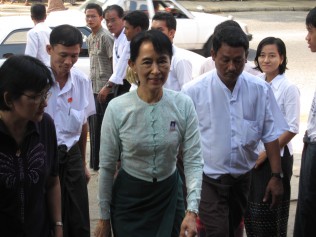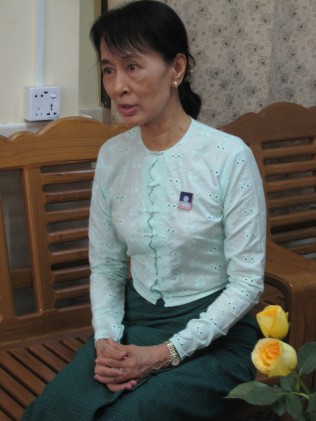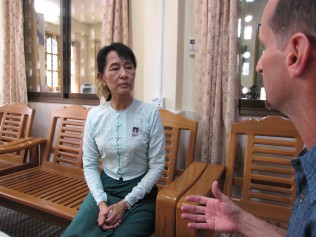It’s one of those common fantasy questions. If you could spend half an hour with any person on the planet, who would that person be?
At any time during the past two decades, I would have answered without hesitation – Daw Aung San Suu Kyi, the Burmese democracy leader and 1991 Nobel Peace Prize recipient.
For most of the past twenty years meeting with Aung San Suu Kyi would of course have been quite impossible given that she spent most of that time under house arrest in Rangoon. On one visit to that city, I had gotten close to the decaying ancestral home in which she was confined only to be turned back by an intimidating soldier guarding the road.
That was in 2004 and it would be the closest I would get for the next seven years. Somehow I got myself blacklisted and my requests for a visa in the ensuing years were rejected.
In December 2010, while visiting Thailand, I decided to try again. The elections in Burma – sham as they were – had just been held and there were some indications that things were loosening up. In addition, there were rumors that somewhere along the way the regime had lost the database that comprised the blacklist.

Most significantly, Daw Suu had been released from house arrest. It was this fact that contributed most to my desire to visit the country. During her previous period of relative freedom, Daw Suu would appear frequently at her front gate, ascend atop a soapbox of sorts, and give speeches to the endearing gathered crowds. The remote chance of this happening again, and of me being there to witness it, was cause enough to disrupt my other plans and try for a visa.
Lo and behold, I got the visa. But even then I wasn’t sure travelling to Burma would work out. My girlfriend was due to arrive at the end of the month and we had planned to go together to Viet Nam. Instead we would now have to scramble – get her a visa for Burma within one day and that same day, book a flight for departure the following day.
Regardless, I immediately told friends and colleagues about my good fortune. The replies were as expected – except for one. A filmmaker friend wrote not just to congratulate me on the good news—but also to ask a question. If it could be arranged, would I be willing to try to meet with Daw Suu and to do a video interview.
Of course I would!
Or maybe not. I couldn’t jeopardize my girlfriend’s and my long-overdue visit to Burma by hanging around Rangoon on the outside chance we’d get some of Daw Suu’s time. It certainly seemed a long shot. Especially when we determined that, since there was a reasonable chance of being detained, interrogated, and kicked out of the country after the meeting, we would try to schedule the meeting for the end of our trip.

The stars aligned and thanks to many overseas calls from my filmmaker friend to people with pseudonyms, on our last day in the country we had an appointment to meet The Lady herself.
We were packed up and had checked out of our hotel. If we were kicked out of the country that would be okay since we were leaving anyway.
When we arrived at the NLD headquarters, no one there knew what was going on or to expect us. The secretly arranged cameraman was nowhere to be seen. There was every indication the meeting wouldn’t happen.
And then suddenly there we were, my girlfriend and I, introducing ourselves to Daw Aung San Suu Kyi and being invited to sit with her in her small upstairs office at the NLD headquarters. She was gracious and incredibly humble. No one introduced us. We were alone in the room with her, quickly followed by two cameramen who had magically appeared.
I was nervous, of course, but I had some crutches – objects to give her, and to serve as initial topics of conversation. There was a CD of Burmese music to pass along from good friends back home and there was a woven shoulder bag from my foster daughter, originally from Mandalay, now living in Thailand. And there was a bookmark from Ethical Traveler – a popular item documenting our Thirteen Tips for the Accidental Ambassador.
That last gift was a spontaneous gesture – one that occurred to me the night before the meeting as I settled into bed with the book I was reading.
The seeds of Ethical Traveler were sown one evening nearly a decade ago, following a book launch event at a Berkeley bookstore. The conversation was about travel and had turned specifically to the ethics of travel to Burma. What many people have misunderstood, however, is that it wasn’t the question of whether or not one should travel to Burma that lead to the founding of ET but rather discussions of whether travelers and tourists could be united as a collective force for positive change in the world.

In 1996, when Daw Suu said “tourists should wait until Burma is a freer and happier country” to visit, it was in direct response to the ruling junta’s proclamation of that year as “Visit Myanmar Year.” The regime needed the money. Suddenly – and without the requisite infrastructure – they wanted to promote tourism. The call for a travel boycott – especially given Daw Suu’s global reach – was a brilliant move. It was that tactic that inspired the founding of Ethical Traveler.
I presented the items to Daw Suu one at a time, using each object as an opportunity to talk about my Burma activist colleagues in the States, my foster daughter in Bangkok, and Ethical Traveler. She listened very intently and took the time to read the liner notes of the CD and to marvel at the clever design of the shoulder bag.
When I handed her the ET bookmark and started to explain that ET originated from conversations about the ethics of travel to Burma, she cut me off excitedly saying, “I appreciate this very much” – and telling us that the NLD would soon be releasing an updated policy paper on travel in Burma.
If I were a journalist I would have asked the obvious follow up questions and thus would have gotten the scoop as to what that policy would be.
There was every indication that the policy would be changed from when a travel boycott was called in the mid 1990’s. In recent years – especially since Daw Suu’s release from house arrest in November 2010 – there had been murmurings about lifting the boycott – but nothing official; and nothing from Daw Suu herself.
Now I was hearing it directly from her. But I’m not a journalist, and I wasn’t thinking that way. I was there to do an interview. And so we quickly moved on to other topics and later I was left wondering – what would that new policy be.
I fully expected to read about it in the press within days or weeks (as was the case with her getting an internet connection at home for the first time – something that also came up during our conversation). Months went by, however, before any news on tourism.
And then just two weeks ago – late May 2011 – The Irrawaddy reported that the NLD had released their policy paper.
The NLD would welcome visitors who are keen to promote the welfare of the common people and the conservation of the environment and to acquire an insight into the cultural, political and social life of the country while enjoying a happy and fulfilling holiday in Burma.
I’m not too sure about the “happy and fulfilling,” part but it is official – mindful travel to Burma is now encouraged. The boycott has ended.
—
NLD Welcomes Responsible Tourism, But Warns Against Abuses
–The Irrawaddy, May 24 2011
Read Ethical Traveler's Reprint Policy.
